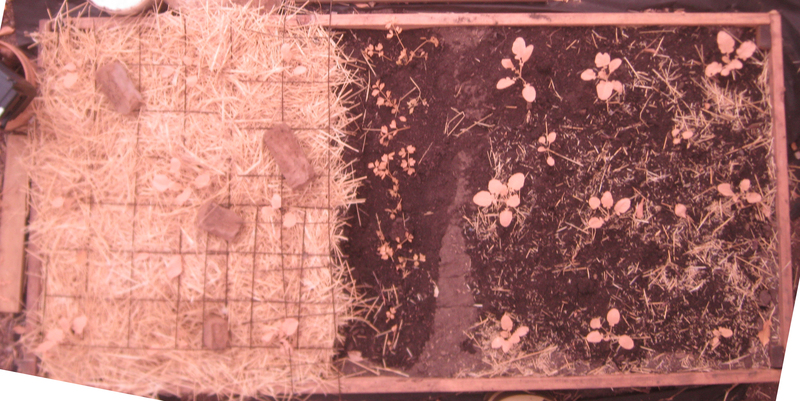What I want to do
Process this raw infragram, taken by a hand-converted infrablue camera (originally beinging to Jeff Warren:
This image was taken by community gardeners who have set up an experiment with a fall planting of collards. They want to see whether mulching makes a difference in plant health. To that end, we designed an experiment with a single raised bed split into halves: half mulched, half unmulched.
My attempt and results
When i upload to infragram.org, the aspect ration is distorted, probably because the system is not expecting a cropped photo:
Next i choose a preset for NDVI blue filters -- colorized:
However, the result seems rather undifferentiated:
Questions and next steps
How can i make the processed image more revealing?





There are a few reasons that the NDVI results from that Infragram photo do a poor job of differentiating plants from nonplants. The primary reason is that the custom white balance setting on the camera is not so good for meaningful NDVI. Another reason is that the plant leaves in the photo are a little overexposed. Another reason is that blue filtered Infragram cameras cannot differentiate grassy mulch (hay, straw, grass clippings) from green plants very well because blue light is used to represent visible light (dry grass reflects about as much blue as do green leaves, but reflects much more red).
A histogram for leaves in the photo shows that the red channel is pinned to the right -- almost all pixels have a value near 255 in the red channel which records near infrared light:


.
A well exposed infrablue photo of leaves from a properly white balanced Infragram camera will have orangey foliage and have a histogram for leaves more like this:
.
Note that there is better separation of the blue and red values, so computed NDVI values will be higher (and have a better chance of being conspicuously higher than the table in the background). .
So to take Infragram photos that differentiate collard leaves from mulch and soil, use a red filtered Infragram that has been properly white balanced, and capture photos with good exposure.
Some Photoshop tweaking could extract a little more information from the current photo, but maybe not very much more.
Chris
Reply to this comment...
Log in to comment
Thank you Chris!!! I am reviewing this post now: http://publiclab.org/notes/warren/08-15-2013/white-balancing-a-canon-camera-for-infragram-photography and generally looking at everything under this heading: http://publiclab.org/wiki/infragram#White+balance
Reply to this comment...
Log in to comment
Hi, Liz - what kind of camera are you using? Is the filter on the outside?
Is this a question? Click here to post it to the Questions page.
Reply to this comment...
Log in to comment
the filter is on the inside. It's actually the one that you hand modified, and gave to me in midtown one day
Reply to this comment...
Log in to comment